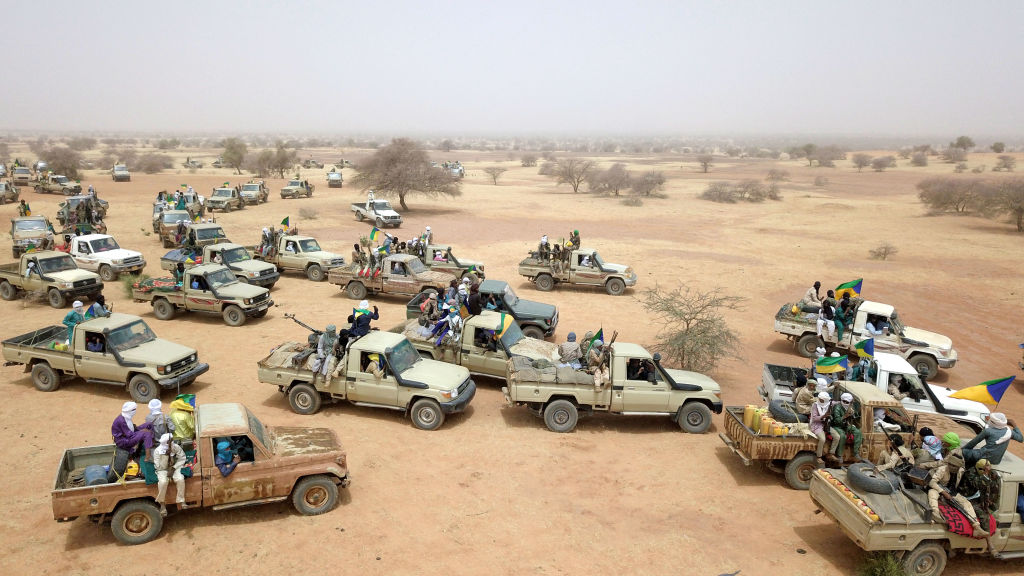Al-Qaida-linked terrorists attacked seven Malian military posts July 1 in a series of coordinated, simultaneous early-morning assaults on urban centers and towns. Jama’at Nusrat al-Islam wal-Muslimin (JNIM) claimed that it gained control of three Army barracks during the attacks.
Mali’s Army claimed that it killed 80 terrorists but did not report any other casualties. JNIM claimed it killed dozens of Soldiers and destroyed more than 100 military vehicles and motorcycles. One military post was in Diboli, a town near the Senegalese border, that largely has been spared from terrorist attacks.
“The border region to Senegal is a major gateway for trade and imports from Dakar ports to Mali that had been relatively stable for years,” Ulf Laessing, head of the Sahel program at the Konrad Adenauer Foundation, told The Washington Post. “This will also worry border communities in Senegal.”
In Kayes, an urban area that also is home to large gold mining operations, a resident said they were awakened by heavy shooting.
“We woke up in shock this morning,” the person told Agence France-Presse (AFP). “There’s gunfire, and from my house I can see smoke billowing towards the governor’s residence.”
A military source confirmed that an explosion was heard from the governor’s house. “By the time we got organized, there was already gunfire at the camp,” the source told AFP.
A local political official wrote on Facebook that the towns of Gogui, Sandare and Nioro also were targeted. The Nioro region, near the Mauritanian border, is a major stop on the trans-Saharan trade route. A day after the attacks, JNIM threatened to blockade Kayes and Nioro, whose residents it accused of collaborating with government forces.
“The frequency of attacks in June is just unheard of so far,” Yvan Guichaoua, a senior researcher at the Bonn International Center for Conflict Studies, told the BBC. “They have really stepped up their activities in the past weeks.”
Ibrahim Yahaya Ibrahim, Sahel deputy project director for the International Crisis Group, characterized the attacks as a “significant show of force by JNIM.” Some of the attacks were launched hundreds of kilometers apart, highlighting the group’s expanding operational reach and sophistication.
“Targeting urban centers also underscored that the group is serious about a strategic shift that has been under way for the better part of a year,” Ibrahim wrote.
In September 2024, JNIM attacked Bamako. It was the first terror attack on the national capital since 2016. Terrorists attacked a military training school and international airport where Russian mercenaries are based, killing at least 77 people, mostly young gendarmerie recruits. The terrorists also stuffed burning rags into the engines of presidential jets belonging to the ruling military junta.
In November 2024, senior JNIM commander Mahmoud Barry said the group’s Sahel operations would focus more on urban areas. Over the past two months, JNIM has attacked Douentza, Timbuktu and the outskirts of Ségou and Sikasso. The group previously had pressured these areas through blockades. JNIM also has called on Malians to mobilize against state forces and Russian mercenaries.
“Although JNIM’s turn toward urban targets could herald a new turn in the conflict, it is unclear whether this will translate into decisive gains for the jihadists,” Ibrahim wrote.
Gen. Assimi Goïta, Mali’s junta leader, pledged to defeat terror groups when he seized power in 2021. Russian mercenaries support Mali’s military, but violence continues. According to the 2025 Global Terrorism Index, Mali ranked fourth among the countries most affected by terrorism last year, when it recorded 604 deaths from 201 terror attacks. JNIM was the main perpetrator of these attacks, but the Islamic State group and other terror organizations also are active in Mali.
JNIM claims it has killed almost 1,000 people across the Sahel since April, most of them members of security forces or militias fighting alongside government forces, according to BBC Monitoring data. Nearly 800 of the deaths were in Burkina Faso, followed by 117 in Mali and 74 in Togo.
Malian civilians also face threats from state forces, militias and Russian mercenaries. Last year, 76% of reported violent civilian fatalities were linked to the armed forces and allied militias, the Africa Center for Strategic Studies reported.
Goïta also promised a return to democracy, but that has not happened. In early July, he was granted a five-year presidential term by Mali’s transitional Parliament. The term is renewable without elections.

